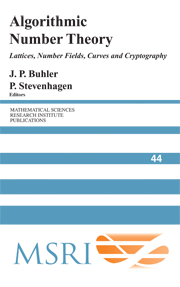Book contents
- Frontmatter
- Contents
- Preface
- Solving the Pell equation
- Basic algorithms in number theory
- Smooth numbers and the quadratic sieve
- The number field sieve
- Four primality testing algorithms
- Lattices
- Elliptic curves
- The arithmetic of number rings
- Smooth numbers: computational number theory and beyond
- Fast multiplication and its applications
- Elementary thoughts on discrete logarithms
- The impact of the number field sieve on the discrete logarithm problem in finite fields
- Reducing lattice bases to find small-height values of univariate polynomials
- Computing Arakelov class groups
- Computational class field theory
- Protecting communications against forgery
- Algorithmic theory of zeta functions over finite fields
- Counting points onvarieties over finite fields of small characteristic
- Congruent number problems and their variants
- An introduction to computing modular forms using modular symbols
Counting points onvarieties over finite fields of small characteristic
Published online by Cambridge University Press: 30 May 2025
- Frontmatter
- Contents
- Preface
- Solving the Pell equation
- Basic algorithms in number theory
- Smooth numbers and the quadratic sieve
- The number field sieve
- Four primality testing algorithms
- Lattices
- Elliptic curves
- The arithmetic of number rings
- Smooth numbers: computational number theory and beyond
- Fast multiplication and its applications
- Elementary thoughts on discrete logarithms
- The impact of the number field sieve on the discrete logarithm problem in finite fields
- Reducing lattice bases to find small-height values of univariate polynomials
- Computing Arakelov class groups
- Computational class field theory
- Protecting communications against forgery
- Algorithmic theory of zeta functions over finite fields
- Counting points onvarieties over finite fields of small characteristic
- Congruent number problems and their variants
- An introduction to computing modular forms using modular symbols
Summary
We present a deterministic polynomial time algorithm for computing the zeta function of an arbitrary variety of fixed dimension over a finite field of small characteristic. One consequence of this result is an efficient method for computing the order of the group of rational points on the Jacobian of a smooth geometrically connected projective curve over a finite field of small characteristic.
The purpose of this paper is to give an elementary and self-contained proof that one may efficiently compute zeta functions of arbitrary varieties of fixed dimension over finite fields of suitably small characteristic. This is achieved via the p-adic methods developed by Dwork in his proof of the rationality of the zeta
function of a variety over a finite field [Dwork 1960; 1962]. Dwork’s theorem shows that it is in principle possible to compute the zeta function. Our main contribution is to show how Dwork’s trace formula, Bombieri’s degree bound [1978] and a semilinear reduction argument yield an efficient algorithm for doing so. That p-adic methods may be used to efficiently compute zeta functions for small characteristic was first suggested in [Wan 1999; 2008], where Wan gives a simpler algorithm for counting the number of solutions to an equation over a finite field modulo small powers of the characteristic.
Information
- Type
- Chapter
- Information
- Algorithmic Number TheoryLattices, Number Fields, Curves and Cryptography, pp. 579 - 612Publisher: Cambridge University PressPrint publication year: 2008
Accessibility standard: Unknown
Why this information is here
This section outlines the accessibility features of this content - including support for screen readers, full keyboard navigation and high-contrast display options. This may not be relevant for you.Accessibility Information
- 5
- Cited by
